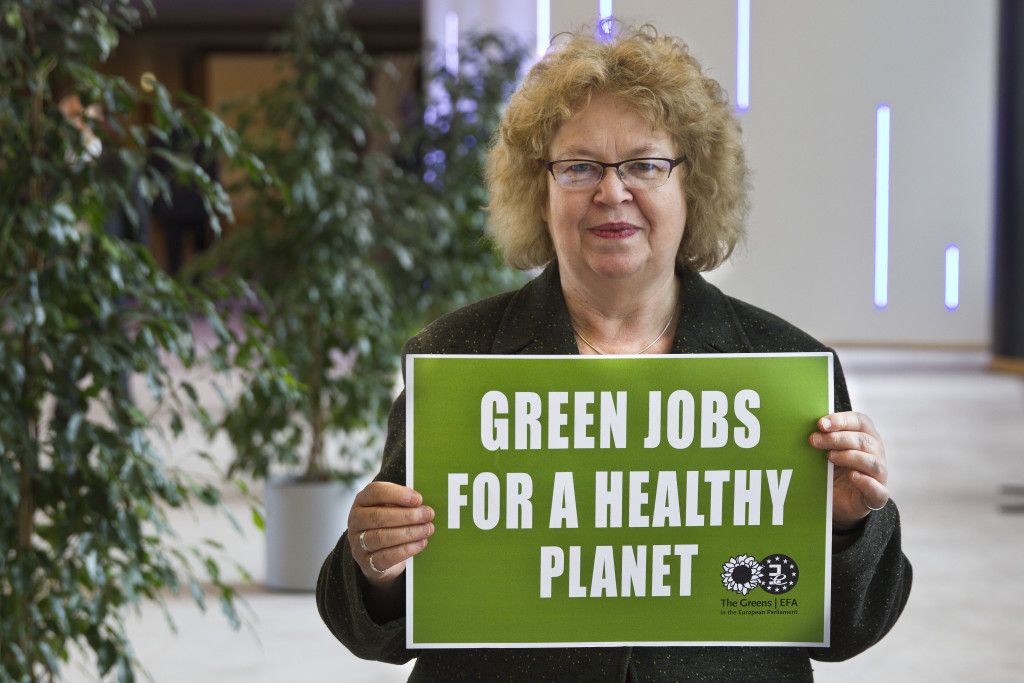
21 June 2018
Jean Lambert, London’s Green MEP, has written an article on ‘Gearing towards a green future of work’ for the Green European Journal.
Read the full piece below, or in the Green European Journal.
Gearing towards a green future of work
Green politics is about building a socially, environmentally, and economically just and sustainable future for everybody on the planet. This vision might be obvious, but the journey to get there is less so. At its core, green political thinking sees humanity as not just existing economically, and getting our economies on the right track is therefore a central challenge. As part of that, we need to understand work and its possible futures.
Economics is, of course, vitally important, and Greens must ensure our economic analysis is robust, evidence-based, and looking to the future. But economics must be seen in context, and human beings exist socially and ecologically as well as economically. Work has the capacity to provide economic security for us as individuals and our families and yet can equally be dysfunctional and exploitative, especially for those in precarious employment or on low pay. Greens should work to support its positive economic function at personal and societal level, but also for it to add maximum social usefulness while respecting environmental limits.
Economic, social and environmental dimensions are all relevant for a full understanding of work, its value, and its future. Much work is primarily important in terms of social usefulness rather than economically – for example, care work. Unpaid work is a special case needing greater attention. Unpaid work takes place on a huge scale, especially by women, but is not economic in the narrow sense of being undertaken for a wage. Yet it is of immense value to the well-being of society. Without unpaid work our current societies and economies would probably cease to function. A better understanding and valuing of unpaid work is long overdue.
The environmental dimension of work is no less important, although often less visible or easily lost sight of. The environmental impacts of economic and industrial activities are becoming more widely understood. This has led to increased acceptance of the transformative potential of the green agenda for the economy and work. Those seeking to delay, dilute, or frustrate the green agenda’s potential to transform the economy should be reminded that there are no jobs on a dead planet. Faced with the broad trends of reduction in working time, persistent inequalities, automation, Greens also need to go further and put forward a vision centred around green industry, just transition, democracy at work, and education.
Dysfunctions of work: excessive working hours and income inequality
The dysfunctional aspects of contemporary work are receiving increasing attention. Against a backdrop of steady, but slow, reduction in average working time, we are still seeing economic pressures, inequality and exploitative employment practices causing excessive working hours.
The health, well-being, and societal benefits of reduced working hours and better work-life balance are well known. Across the 34 OECD countries as a whole there is a general trend of workers reducing the number of hours worked. The proportion of OECD workers working less than 40 hours a week increased from 30 per cent in 2000 to 35 per cent in 2016. Those working less than 35 hours rose from 16 per cent to 23 per cent. With a few exceptions, working hours are slowly falling. Greens should work to accelerate this trend. In Germany, 900 000 metal and engineering workers recently won the right to a 28-hour week, as part of an agreement following industrial action led by the IG Metall trade union, and in the UK Greens are arguing for a 35-hour week.
Low-paid workers are least able to reduce their working time, even if they wanted to, and are more likely to work excessive hours. Extreme and widening levels of pay inequality are not economically or socially just, and cannot provide a sound basis for truly sustainable societies. Measures to reduce income inequality include making income tax more progressive; increasing minimum wage levels to real living wage standards; requiring companies to set and narrow top-to-bottom pay ratios (ideally 10:1); banning exploitative employment practices; and introducing a universal basic income. Such measures should be part of Green objectives to correct the dysfunctional impacts of market forces in the world of work: long working hours and income inequality.
‘Smart’ automation
Greens should recognise the positive and negative potential of technology. Historically, technology has transformed agricultural and industrial production, work, and our economies. It has changed human relationships with nature and increased labour productivity, as described by classical economics.
A new wave of ‘smart’ automation is projected to displace a significant proportion of jobs in major economies. Recent studies suggest around 30 per cent of UK jobs, 35 per cent of German jobs, and 38 per cent of US jobs will be lost by the early 2030s. Although job losses vary hugely between sectors, education is the greatest factor determining job displacement. Graduates will be affected by 12 per cent but those educated to secondary level (GCSE in the United Kingdom) or equivalent will be affected by 46 per cent in the UK. If ever there was a time to increase investment in education, it is now. But the research also shows that those most affected will be the economically vulnerable and insecure, not those who might be in an economic position to choose to work less.
The twin challenges of smart automation and the environmental impacts of greenhouse gas and resource intensive production certainly require that we rethink and transform our existing models of work and industry. Some of the least environmentally damaging jobs are in labour intensive areas, including services, which do not involve material production. Reducing the environmental impact of work could partly involve a dematerialisation of work, with these sectors expanding. With labour-intensive work value is added by mental, physical, creative or communicative activity. These include highly valued, non-routine activities with low material impacts and lower automation risk. Research needs to further explore this aspect of future work, which encompasses traditional areas like social care and education, but also newer ones.
Green jobs, transformation of industry, and expanding the circular economy
To give way to these new models of economic activity, there needs to be a radical and urgent transition to a low-impact, low-to-zero carbon economy. This requires a roadmap, with particular focus on the most polluting sectors and on the circular economy. Focusing on highly polluting, carbon-intensive sectors is particularly important because environmental improvements in those sectors can make the biggest differences to overall reductions in pollution and emissions. If these industries are outsourced, the problem is moved elsewhere, where production may be even more damaging to the environment – so-called ‘carbon leakage’. The challenge is to transform those industries, not export them.
Europe’s energy-intensive and carbon-intensive sectors need specific attention to reduce their energy and carbon footprints, and research and development innovation has an important role to play. The solution partly involves replacing more raw materials with recycled ones, in heavy industry as across manufacturing more generally. This replaces a linear model of production with a circular one. In the steel industry, for example, coal-powered blast furnaces can be replaced with electric-powered arc furnaces which recycle scrap steel rather than make steel from iron ore. This is a better solution than replacing EU-produced steel with imported steel.
The potential benefits from accelerating the circular economy agenda are massive and circular economy principles need to be applied across the materially productive economy. Waste produced in Europe should largely be redefined as a resource to be repurposed within Europe. This would transform design and production systems, especially in manufacturing. European industry has an opportunity to be a world leader and set global standards on this agenda. Innovation and resource efficiency gains is also one of the most promising areas for future green jobs. The International Labour Organization (ILO) estimates this green transition could generate 24 million new jobs globally by 2030, which would offset some of the job losses from automation. However, these jobs will not all be in Europe and will not necessarily go to those whose current jobs are phased out. We therefore need to ensure ambitious circular economy objectives are the centrepiece of industrial policies.
Just transition, workforce participation, and safety
The disruptive consequences of the green transformation means that the transition needs to be managed fairly, with support for the retraining of workers directly affected. Trade unions have rightly called for a ‘just transition’ to be central to this green transformation, an ambition strongly supported by Greens in Europe and internationally. The 2015 Paris Agreement includes commitment to “a just transition of the workforce” and in 2017 the European Parliament voted for a Just Transition Fund to invest in affected EU regions. In its 2015 report on just transition, the ILO includes the involvement of stakeholders and the importance of social dialogue, which should include the participation of workers and their representatives.
Workers must be able to participate in decisions affecting them and their industries. Worker participation and engagement should be a key part of just transition planning, but also more generally. Already a feature in cooperatives, Greens should be advocating worker participation across all organisations and companies. Trade unions should have the right to appoint green workplace representatives, and the development of the trade union-led ‘green workplaces’ agenda should be supported, giving workers greater involvement in setting environmental policy and over the local environment of their workplaces. This has the potential to build networks of green champions across workplaces, companies, industries, and in wider society.
Workers should have the right to work in safety: that must mean free from exposure to materials, processes or conditions hazardous to workers and the environment. This agenda is well developed in Europe and is increasingly being taken up internationally, especially where health and safety legislation is poor. The greening of work can therefore encompass making work safe. Responses to the Bangladesh Rana Plaza factory disaster and rules governing worker exposure to nuclear materials are two issues I’ve worked on and there are many other examples. Greens should engage on such issues internationally, collaborating with trade unions and trade justice campaigners, and build solidarity.
An expanded social and cooperative economy
What kind of future employers do we want? Part of the answer is to be found in increasing the proportion of social economy and cooperative employers in the economy as a whole. Non-profit organisations and cooperatives thrive in a wide range of sectors across Europe. Operating under diverse legal structures, these organisations and businesses have social objectives at their centre. Some are part-driven by profit, but in parallel with social objectives, not at their expense. Cooperatives have organisational structures based on horizontal, democratic, and profit-sharing principles. Spain’s Mondragon is Europe’s biggest, best known example, but there are many more. A social enterprise runs some busy London bus routes. Greenwich Leisure, which is owned by its staff and society members, manages 250 UK leisure centres in partnership with over 30 local councils. The centres employ around 10 500 staff.
Cooperatives and the social economy are important for a green economic future and vision of work. First, they demonstrate that alternatives to the solely for-profit model can thrive and be a viable source of employment. Second, they offer greater participation, workplace democracy and profit-sharing for workers. Third, they can provide added social value for local communities or other beneficiary groups. Social economy and cooperative models are preferable to the narrowly for-profit economic model and need to make up an increasing proportion of the economy as a whole.
The cooperative and social economy can be expanded through policy measures such as tax breaks, direct subsidies, grants, procurement, and increasing mutual support within the social economy. The EU has gone some way in recognising these, but Greens should argue for policy shifts to actively favour the social economy at all political levels. At EU level, single market and procurement rules need to be revised to facilitate these objectives, especially in relation to smaller businesses. This agenda should also be taken forward at national, regional and local level, even within the current EU framework.
Lifelong learning and basic income as a 21st-century necessities?
The predicted impacts of automation cannot be ignored and call for radical changes to education and social protection systems. As more areas of work become increasingly vulnerable the only solution is to put lifelong learning centre-stage, and planning for that must begin now. There may be less work to go round, and the idea of a lifelong full-time career may be receding. But through lifelong learning human capacity can be reinvested in and reinvented.
Individuals and their choices will not solve this alone, conditions need to be put in place to make lifelong learning a possibility for everyone. This requires far-reaching public action, planning, and investment. Sustained, high levels of public funding are needed for education. But people also need economic security in order to participate in lifelong learning, and even in the wealthiest countries, this is far from universal. For reasons of social and economic justice, but also as an enabler of lifelong learning, we should focus on making economic security the norm for all citizens.
With trials happening across Europe and growing support from public figures and think-thanks, the tide appears to be turning in favour of universal basic income. An emerging ‘post-work’ movement heralding the end of work as we know it is also adding its voices to the longstanding calls of many Greens and others this proposal. This unconditional payment to all citizens as a basic right is something long-advocated by some Greens. Could this be the mechanism that provides the economic security to make lifelong learning possible? The EU should play a role facilitating more trials and research. Maybe, one day, we could see a Europe-wide universal basic income?
Green answers in uncertain times
The politics of 21st-century work requires responding to a number of challenges. ‘Smart’ automation is throwing up projections of significant structural job losses. The green transformation of industry requires fundamental changes to the economy, as highly polluting sectors shrink and new, innovative jobs and sectors emerge. The dysfunctions of exploitative work are being increasingly exposed, whilst the viability and value of the ‘full-time job-for-life’ model is now seriously in question.
Green responses should seek to combat excessive working hours and income inequality. We should argue for an accelerated re-purposing of industry towards environmentally and socially beneficial outcomes and for expanding the co-operative and social economy. Work itself needs re-valuing to take account of social and environmental dimensions and work-life balance. With access to lifelong learning growing in importance, its provision must be centre stage. This can only happen with high levels of public funding and improved economic security for all. The potential for universal basic income needs to be fully explored. These are uncertain times. But it is clear that green political ideas have never been more relevant.

